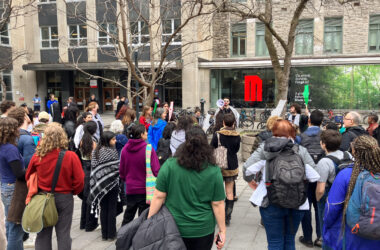 Sophie Silkes
Sophie Silkes Sophie Silkes
Sophie SilkesThe Students’ Society of McGill University and University Services co-sponsored an open forum in the Shatner Ballroom on Thursday to discuss the new rules and regulations for cycling and pedestrian safety on McGill’s downtown campus. A panel of professors, advisors, and students responded to the questions and comments posed by those present at the forum.
“I was positive and idealistic that we were going to find some consensus, negotiate some ideas and projects, but I was also realistic knowing that lately McGill administration has been very unilateral in their decision making,” said Christian Scott, U3 Sociology and IDS.
The strong response generated by some students and faculty members is partly due to McGill’s University Master Plan, an 81-page document that addresses current facilities and space needs while making projections for growth and change in the future. which was approved by the McGill Board of Governors on April 7, 2008.
While some components of the Master Plan were implemented nearly a decade ago, the most extensive consultation and review occurred during the 2005/2006 year. One of these components is the McGill Green Project, which mandates that cyclists must dismount their bikes on lower campus and McTavish Street in order to ensure pedestrian safety, causing an outrage among many students and professors.
“Forty-five years ago, the bicyclists were at the forefront of the green movement. Imagine my anger at being at the forefront of this fight for 25 years and being told by a man in a fluorescent suit holding a stick that I had to walk my bicycle because it is dangerous,” said Professor Pieter Sijpkes, an associate professor in the School of Architecture. “I agree that we should have a campus as safe as possible. Instead of closing McGill campus to cyclists, we should welcome them. We should welcome them because they are the eyes that will make the place safe.”
In order to ensure the safety of cyclists and pedestrians, Sijpkes suggested making the distinction between “high-speed” and “low-speed” traffic, similar to vehicular standards. The McGill campus should not be home to high-speed cyclist traffic, he said.
“With regard to speed and speed limits, the main thing that the literature and research that we have done has shown us that people respond to their environments appropriately” said Jacob Larsen, a doctoral candidate in Urban Planning. “Rather than imposing speed limits, a better solution would probably be to design the campus in such a way where people are encouraged by themselves to ride slower.”
Jim Nicell, vice-principal University Services said that although the university’s priority is safety, some feel that these claims have been exaggerated.
“It is my impression that there has been an overestimation of the dangers of cycling and also an overestimation of the difficulty of implementing various mitigation efforts to those dangers,” said Randall Blom a student Senator of Law. “But, these difficulties can be overcome. For us to say that it is too difficult to implement, I am not satisfied by that answer.”
Because these changes were implemented after the May 2010 convocation ceremonies, many individuals felt as though there was a lack of consultation and communication between the administration and the greater McGill community.
“The McGill University Master Plan was approved in 2008. So there was lots of consultation that went into that,” said Blom. “Unfortunately, due to our short stay at this university, that all happened probably before we as students were here. So, it is very natural for us to feel […] that we do not play a part in this consultation.”
Nicell stressed that there were numerous opportunities for individuals to express their concerns, ranging from forums to presentations.
“We tried to make as many presentations as possible to get out there, to get an idea of what the priorities of the people are,” said Nicell “I really think that we managed to capture them. I’m looking for that consultative process so that we can get more student input.”
“I think it’s really great that we are having a conversation about this as a community and on issues that affect us,” said SSMU Vice-President University Affairs Joshua Abaki. “It is really important to provide a forum where people can compare their different views and you actually get an opportunity to hear what people have to say and their rationale behind a certain position.”
Nicell said that the forum was better than what he had expected based on the emails that he had received over the course of the summer.
“I want to make it very clear that there is no clear consensus on any of this. What I was happy about was that it was incredibly respectful,” said Nicell “Some of the comments over the last three or four months were insulting. I don’t say insulting to me personally but insulting to the intelligence of the people who have been debating this stuff for years and trying to figure out a solution.”








